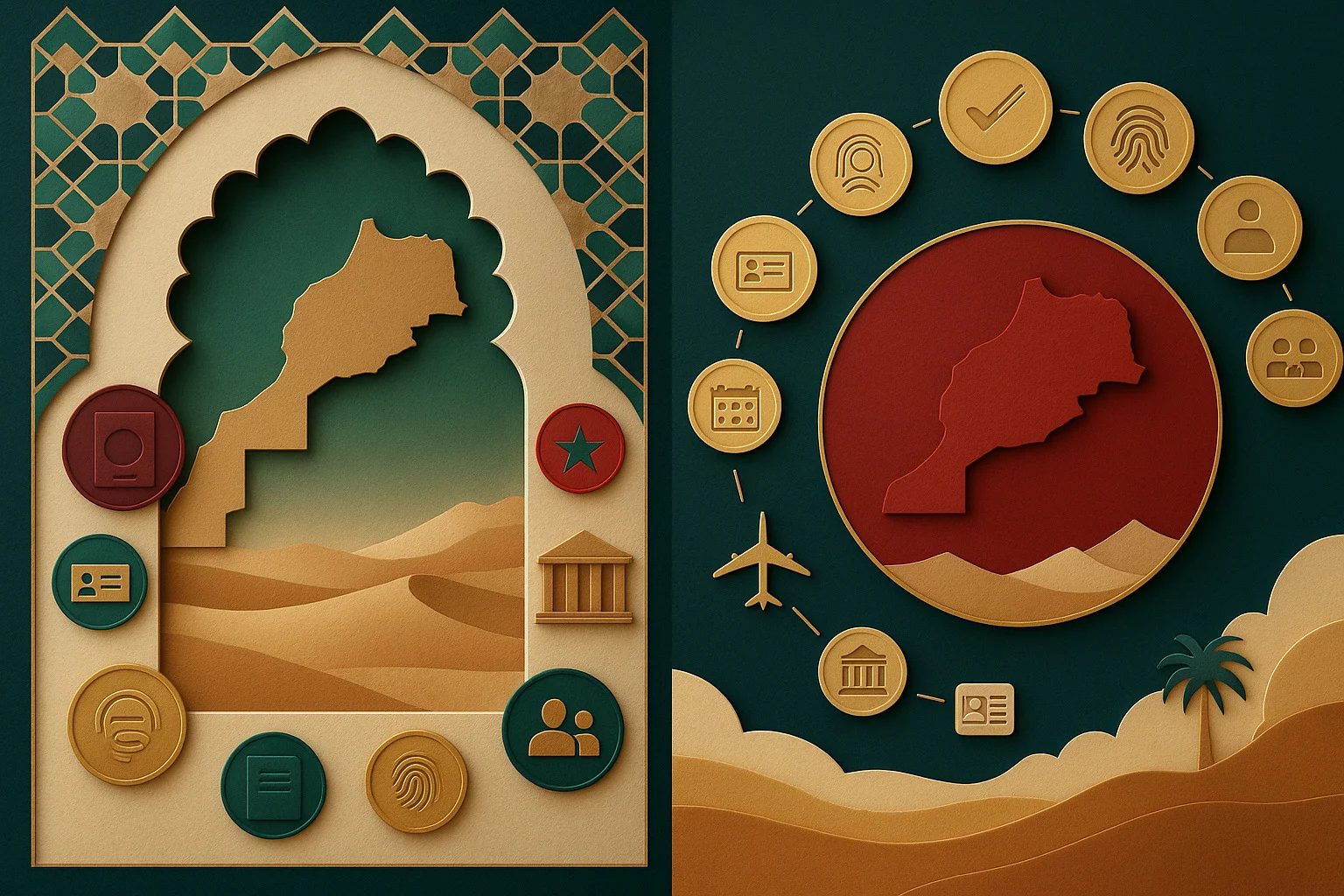How to Get Morocco Residence in 2025 — Carte de Séjour
120
9/24/2025

How to Get Morocco Residence in 2025 — Carte de Séjour
Looking to stay in Morocco beyond 90 days in 2025? You will need to apply for the carte de séjour, the Moroccan residence card. Most foreigners enter on a long-stay visa (type D), then apply at the local police/prefecture within 90 days of arrival. This guide explains the routes (work, family, student, visitor), eligibility, documents, costs, renewals, and the mistakes that commonly cause delays.
Quick answer (2025)
Eligibility: long-stay visa (type D) + purpose (work, family, student, retiree/visitor). Deadline: apply for the carte de séjour within 90 days of arrival. Validity: usually 1 year first, then 2–3, up to 10 years. Documents: passport, photos, visa, lease/title, income proof, police clearance, insurance. Renewals: keep residency continuous to qualify for long-term residence and eventual naturalisation (usually 5+ years).
Routes at a glance (one clear table)
| Route (2025) | Who it fits | Initial validity | Renewals | Work rights | Path to long-term stay |
|---|---|---|---|---|---|
| Work | Employees with employer sponsorship + work permit | 1 year | Renewable; up to 10 years | Yes, tied to employer/role | Counts toward long-term and naturalisation |
| Family | Spouses/children of Moroccan citizens or residents | 1 year | Renewable; longer validity possible | Spouse can usually work; children study | Counts toward long-term and naturalisation |
| Student | Enrolled in Moroccan university/institution | 1 year | Annual renewals, linked to studies | No full work rights; limited permissions | Counts if switching after graduation |
| Visitor/Retiree | Financially independent, retirees with income | 1 year | Renewable; may extend to 5–10 years | No local work rights | Counts toward long-term residence |
Eligibility checklist (2025)
- Enter with a long-stay visa (D) aligned to your purpose (work, study, family, visitor).
- Apply for the carte de séjour within 90 days of arrival.
- Valid passport (6–12 month buffer) and clear immigration record.
- Proof of housing in Morocco (lease, ownership, host declaration).
- Proof of funds/income (salary, pension, savings, sponsor support).
- Police clearance from home country; sometimes Moroccan extract required.
- Health insurance covering Morocco.
Step-by-step (with timing)
- Secure long-stay visa (type D). Apply before arrival at a Moroccan consulate; allow 2–4 weeks processing.
- Arrive in Morocco. Keep entry stamps and boarding passes; your 90-day clock starts on entry.
- Gather documents. Passport, D visa, lease/title, photos, income proof, police clearance, insurance, and route-specific papers.
- Apply at local police/prefecture. Submit dossier and application form within 90 days. Book early; queues exist in major cities.
- Receive carte de séjour. Initial cards usually valid for 1 year; keep receipt during processing.
- Renew annually. After several renewals, validity can extend (2, 3, 5, up to 10 years).
Documents (core & extras)
- Core: Passport + copies, long-stay visa D, application form, photos.
- Housing: Rental contract, property deed, or host declaration.
- Funds/income: Payslips, employment contract, pension statements, or bank balances.
- Work route: Work permit (ANAPEC approval), employer sponsorship letter.
- Student route: Enrollment letter from Moroccan institution.
- Family route: Marriage/birth certificates, partner’s ID/residency.
- Visitor route: Pension/savings proof, insurance.
- Extras: Police clearance, medical certificates if requested, translations/apostilles.
Costs & timeline (indicative)
Visa fees: Long-stay visa D ≈ €100–150. Residence card fees: a few hundred dirhams per year depending on category. Translations/apostille: budget extra. Timeline: visa pre-approval (2–4 weeks), residence application (within 90 days), card issuance (4–8 weeks). Renewals usually processed in a few weeks; plan buffer.
What changed in 2025
- Digitalisation: gradual move to online appointments and some e-processes in big cities, but in-person filing still required.
- Stricter deadlines: police stations enforce the 90-day rule more firmly; late filings risk fines or refusals.
- Proof of funds scrutiny: visitor/retiree categories need clearer bank records; cash-only applicants often refused.
Common mistakes to avoid
- Arriving on a tourist visa and overstaying instead of securing a long-stay visa D.
- Missing the 90-day deadline for applying for the carte de séjour.
- Weak housing proof — informal rental without notarisation can be rejected.
- Insufficient funds or inconsistent bank statements.
- Omitting police clearance or failing to translate/attest civil documents.
Expert opinion
“Strong Moroccan residence applications in 2025 are built around the D visa entry, a complete document chain, and respecting the 90-day filing deadline. Most refusals come from late filing or weak housing/financial proof.” — VelesClub Int. Immigration Team
FAQ
Do I need a visa to apply for residence?
Yes. Most foreigners require a long-stay visa D before applying for the carte de séjour.
Where do I apply for the residence card?
At the local police/prefecture (Bureau des Étrangers) near your Moroccan residence.
How long is the first carte de séjour valid?
Usually 1 year. Renewals can extend validity to 2, 3, 5, or 10 years.
What happens if I miss the 90-day deadline?
Late filings risk fines, refusal, or difficulty renewing. Apply within 90 days of arrival.
Does buying property give automatic residency?
No. Owning real estate helps prove housing and ties, but you must still apply through the normal residence process.
Next steps
Planning a move to Morocco in 2025? Explore practical checklists on our platform and use the dedicated Residency & Citizenship hub to build your own audit-ready application file, track renewals, and avoid common mistakes.
Are there any questions or do you need advice?
Leave a request
Our expert will contact you to discuss tasks, choose solutions and be in touch at each stage of the transaction.
